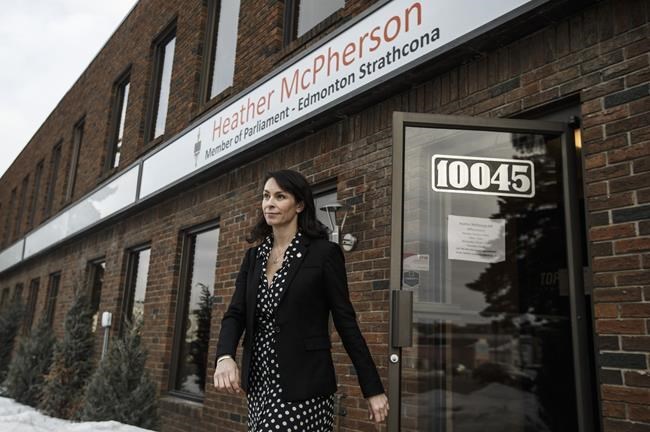OTTAWA — Alberta's legislature may have been silenced but its partisan warfare relocated Wednesday to the House of Commons as MPs held an emergency debate on the province's soaring number of COVID-19 cases.
Edmonton New Democrat MP Heather McPherson requested the debate and used it to blast Alberta Premier Jason Kenney's handling of the health crisis, which she said has resulted in the highest infection rate in North America and left the province's health-care system on the "verge of collapse."
"If you want to know why it is so bad in Alberta, why other provinces have withstood the third wave better than my province, the answer is clear: It is Jason Kenney," McPherson said in a speech launching the late-night debate.
Kenney, in McPherson's estimation, has failed every step of the way, taking a "Donald Trump-like" approach to the pandemic.
He ignored the evidence of science and the pleas of doctors, downplayed the seriousness of COVID-19, "belittled" efforts to control the spread and, even as the crisis deepened, took only "half measures" to impose public health restrictions while blaming everyone but himself for the problem, she said.
"Thanks to the bumbling, stumbling joke that our provincial government has become, we have the single, greatest health crisis that Alberta has ever seen," McPherson said, her voice breaking at times with emotion.
"Jason Kenney has been an unmitigated disaster for Alberta."
She argued that Alberta has become a "Petri dish" for more deadly and contagious mutations of the COVID-19 virus that will spread across the country if nothing is done to stamp out the fire in the province.
McPherson appealed to the federal Liberal government to step in and help Albertans by directing more vaccines to the province's hot zones, enhancing sick leave benefits and introducing national pharmacare.
But she didn't spare Prime Minister Justin Trudeau from criticism.
"He has watched this happening in Alberta and he has done nothing because he would rather watch Alberta burn than help Jason Kenney."
She later agreed to "rephrase" that accusation, after being chided by a Liberal MP, saying that the federal government has been "missing in action" during Alberta's crisis.
As the debate was raging, Trudeau was talking to Kenney. The Prime Minister's Office said in a statement about the phone call that Trudeau "offered the federal government’s support to assist Alberta in responding to the rising number of COVID-19 cases" as well as the "partnership between both governments to quickly deliver safe and effective vaccines to Albertans."
Alberta Conservative MPs, some of whom used to serve with Kenney when he was in federal politics, pushed back against McPherson's accusations of the premier's incompetence.
"Let's talk about the federal failures and we can leave the provincial debates to the provincial legislatures instead of using this seat to attack provincial politicians who aren't even here to defend themselves," said Garnett Genuis.
Kenney's government abruptly suspended Alberta's legislature earlier this week.
Calgary MP Michelle Rempel Garner, the Conservatives' health critic, said other Canadians need to understand that Alberta was in a severe economic downturn before the pandemic hit and that lockdowns made matters much worse.
It's not that Albertans don't want to follow public health orders, she argued, it's that "people need to eat."
"It's very paternalistic to say just that people who might not be following restrictions are doing so from a place of just sort of like bourgeois contempt for the law ... Lockdown is a luxury for a lot of people in my community. That's just the reality."
Health Minister Patty Hajdu said she shares McPherson's worry about what's happening in Alberta. She said Ottawa has been offering Kenney support, as it has done in other provinces, and will be there for Albertans.
Still, she pointed out that 80 per cent of the hundreds of billions of dollars spent on pandemic relief measures have come from the federal government.
Alberta Conservative MPs laid the blame for their province's woes squarely on the federal government's failure to provide a stable supply of vaccines back in February and March, when production problems repeatedly delayed anticipated deliveries.
But Hajdu noted that 17.2 million doses of vaccines have now been delivered across the country, putting Canada third in the G20 in terms of vaccination rates, and deliveries of vaccines are steadily increasing.
As for directing more vaccines to hot zones within the province, Hajdu said it's strictly within Alberta's jurisdiction to decide how to allocate its share of vaccines. It could, as Ontario has done, choose to give priority access to people in the hardest-hit areas, she said.
Conservative MPs repeatedly referenced the fact that the United Kingdom, which led the world in vaccinations during the winter, is now reopening whereas Canada is struggling to cope with a third wave of COVID-19.
But Hajdu said vaccines are only part of the answer. She noted that the U.K. imposed public health restrictions that were much more stringent than those imposed in Alberta and some other provinces.
This report by The Canadian Press was first published May 5, 2021.
Joan Bryden, The Canadian Press




